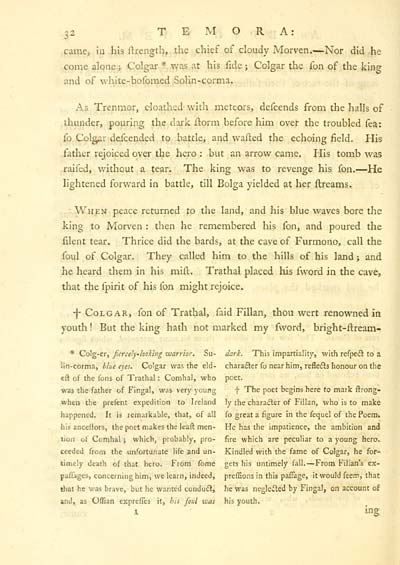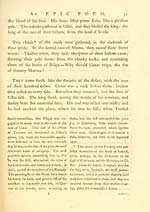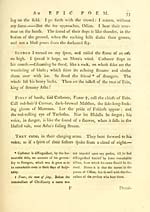Download files
Complete book:
Individual page:
Thumbnail gallery: Grid view | List view

32 T E M O R A:
came, in his ftrength, the chief of cloudy Morven. — Nor did -he
come alone j Colgar * was at his fide ; Colgar the fon of the king
and of white- bofomed Solin-corma.
As Trenmor, doathed with meteors, defcends from the halls of
thunder, pouring the dai'k ftorm before him over the troubled fea:
fo Colgar defcended to battle, and wafted the echoing field. His
father rejoiced over the hero : but an arrow came. His tomb was
raifed, v/ithout a tear. The king was to revenge his fon. — He
lightened forward in battle, till Bolga yielded at her ftreams.
When peace returned to the land, and his blue waves bore the
king to Morven : then he remembered his fon, and poured the
filent tear. Thrice did the bards, at the cave of Furmono, call the
foul of Colgar. They called him to the hills of his land ; and
he heard them in his mift. Trathal placed his fword in the cave,
that the fpirit of his fon might rejoice.
•f- Colgar, fon of Trathal, faid Fillan, thou wert renowned in
youth ! But the king hath not marked my fword, bright-ftream-
* Colg-er, ficrcely'looking warrior, Su- dark. This impartiality, with refpeiS to a
lin-corma, blue eyes. Colgar was the eld- character fo near him, reflefls honour on the
eft of the fons of Trathal : Comhai, who poet.
was the father of Fingal, was very young f The poet begins here to mark ftrong-
when the prefent expedition to Ireland jy the character of Fillan, who is to make
happened. It is remarkable, that, of all fo great a figure in the fequel of the Poem,
his anceftors, the poet makes the leaft men- He has the impatience, the ambition and
tion of Comhai ; which, probably, pro- fire which are peculiar to a young hero,
ceeded from the unfortunate life and un- Kindled with the fame of Colgar, he for-
timely death of that hero. From fome gets his untimely fall. — From Fillan's ex-
paflages, concerning him, we learn, indeed, preflions in this pafTage, it would feem, that
that he was brave, but he wanted condu£t, he was neglected by Fingal, on account of
and, as Oflian expreffes it, his foul was his youth.
came, in his ftrength, the chief of cloudy Morven. — Nor did -he
come alone j Colgar * was at his fide ; Colgar the fon of the king
and of white- bofomed Solin-corma.
As Trenmor, doathed with meteors, defcends from the halls of
thunder, pouring the dai'k ftorm before him over the troubled fea:
fo Colgar defcended to battle, and wafted the echoing field. His
father rejoiced over the hero : but an arrow came. His tomb was
raifed, v/ithout a tear. The king was to revenge his fon. — He
lightened forward in battle, till Bolga yielded at her ftreams.
When peace returned to the land, and his blue waves bore the
king to Morven : then he remembered his fon, and poured the
filent tear. Thrice did the bards, at the cave of Furmono, call the
foul of Colgar. They called him to the hills of his land ; and
he heard them in his mift. Trathal placed his fword in the cave,
that the fpirit of his fon might rejoice.
•f- Colgar, fon of Trathal, faid Fillan, thou wert renowned in
youth ! But the king hath not marked my fword, bright-ftream-
* Colg-er, ficrcely'looking warrior, Su- dark. This impartiality, with refpeiS to a
lin-corma, blue eyes. Colgar was the eld- character fo near him, reflefls honour on the
eft of the fons of Trathal : Comhai, who poet.
was the father of Fingal, was very young f The poet begins here to mark ftrong-
when the prefent expedition to Ireland jy the character of Fillan, who is to make
happened. It is remarkable, that, of all fo great a figure in the fequel of the Poem,
his anceftors, the poet makes the leaft men- He has the impatience, the ambition and
tion of Comhai ; which, probably, pro- fire which are peculiar to a young hero,
ceeded from the unfortunate life and un- Kindled with the fame of Colgar, he for-
timely death of that hero. From fome gets his untimely fall. — From Fillan's ex-
paflages, concerning him, we learn, indeed, preflions in this pafTage, it would feem, that
that he was brave, but he wanted condu£t, he was neglected by Fingal, on account of
and, as Oflian expreffes it, his foul was his youth.
Set display mode to: Large image | Transcription
Images and transcriptions on this page, including medium image downloads, may be used under the Creative Commons Attribution 4.0 International Licence unless otherwise stated. ![]()
| Early Gaelic Book Collections > Ossian Collection > Temora, an ancient epic poem, in eight books > (76) |
|---|
| Permanent URL | https://digital.nls.uk/82190630 |
|---|
| Description | Selected books from the Ossian Collection of 327 volumes, originally assembled by J. Norman Methven of Perth. Different editions and translations of James MacPherson's epic poem 'Ossian', some with a map of the 'Kingdom of Connor'. Also secondary material relating to Ossianic poetry and the Ossian controversy. |
|---|
| Description | Selected items from five 'Special and Named Printed Collections'. Includes books in Gaelic and other Celtic languages, works about the Gaels, their languages, literature, culture and history. |
|---|

